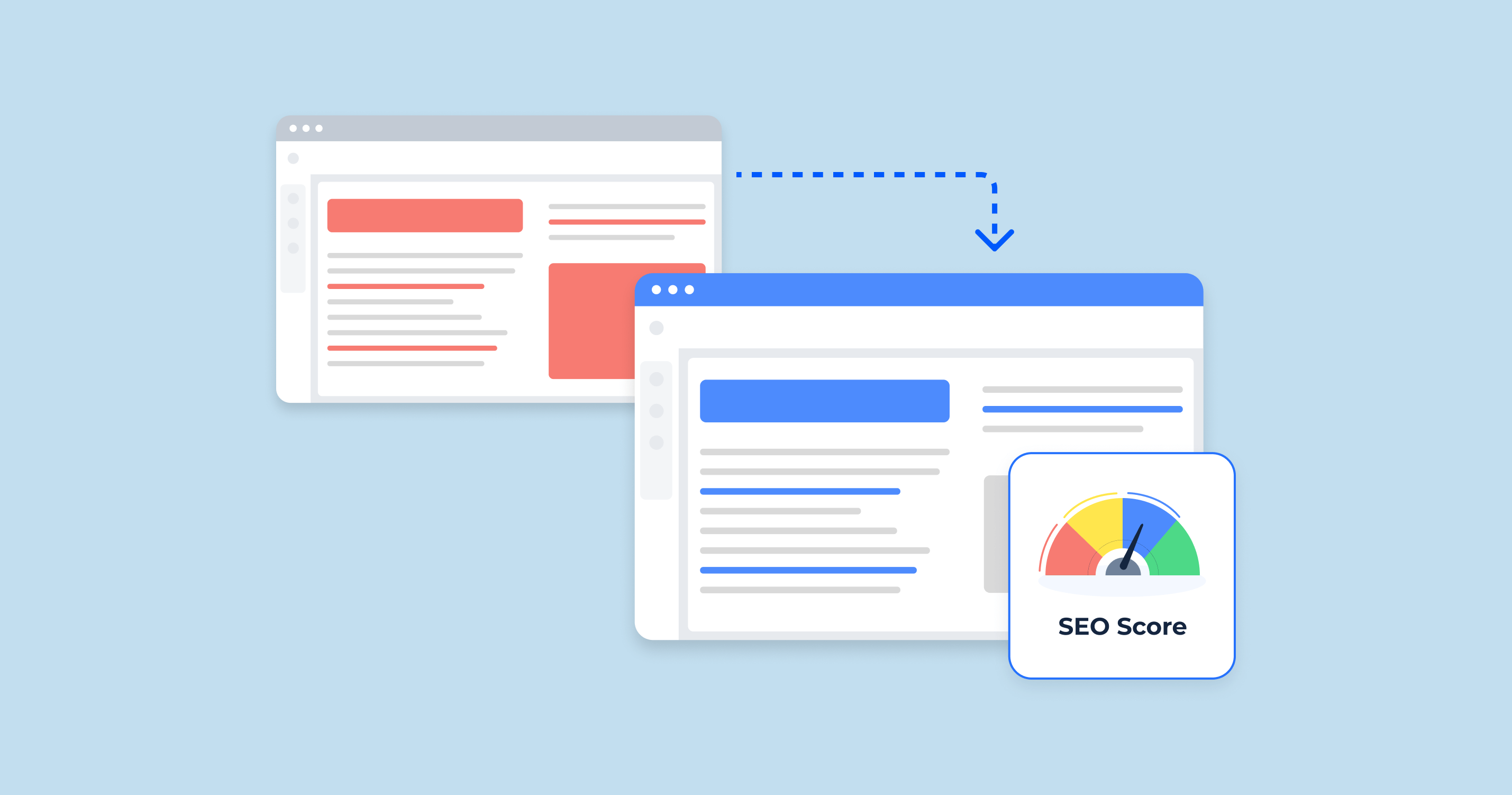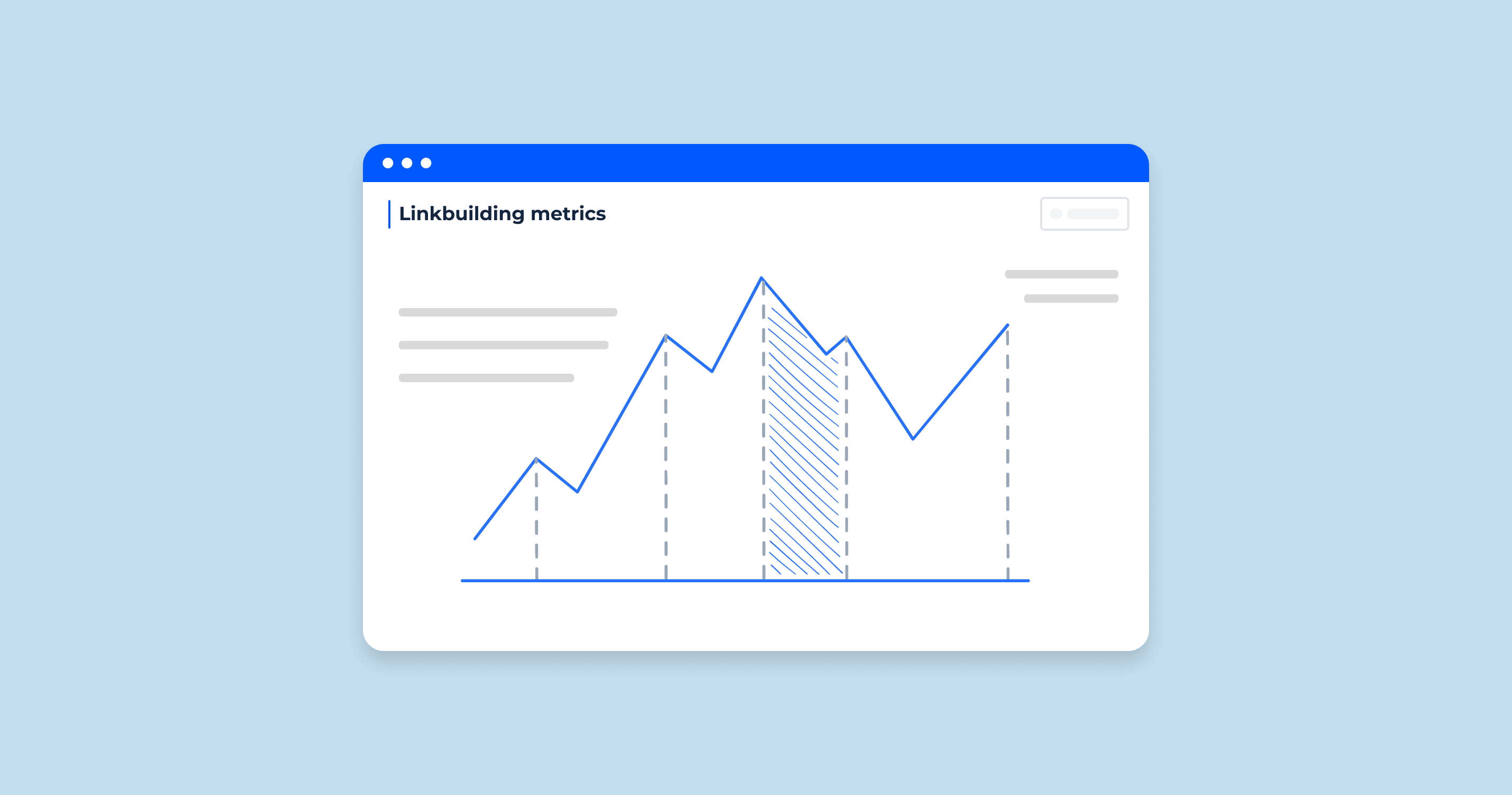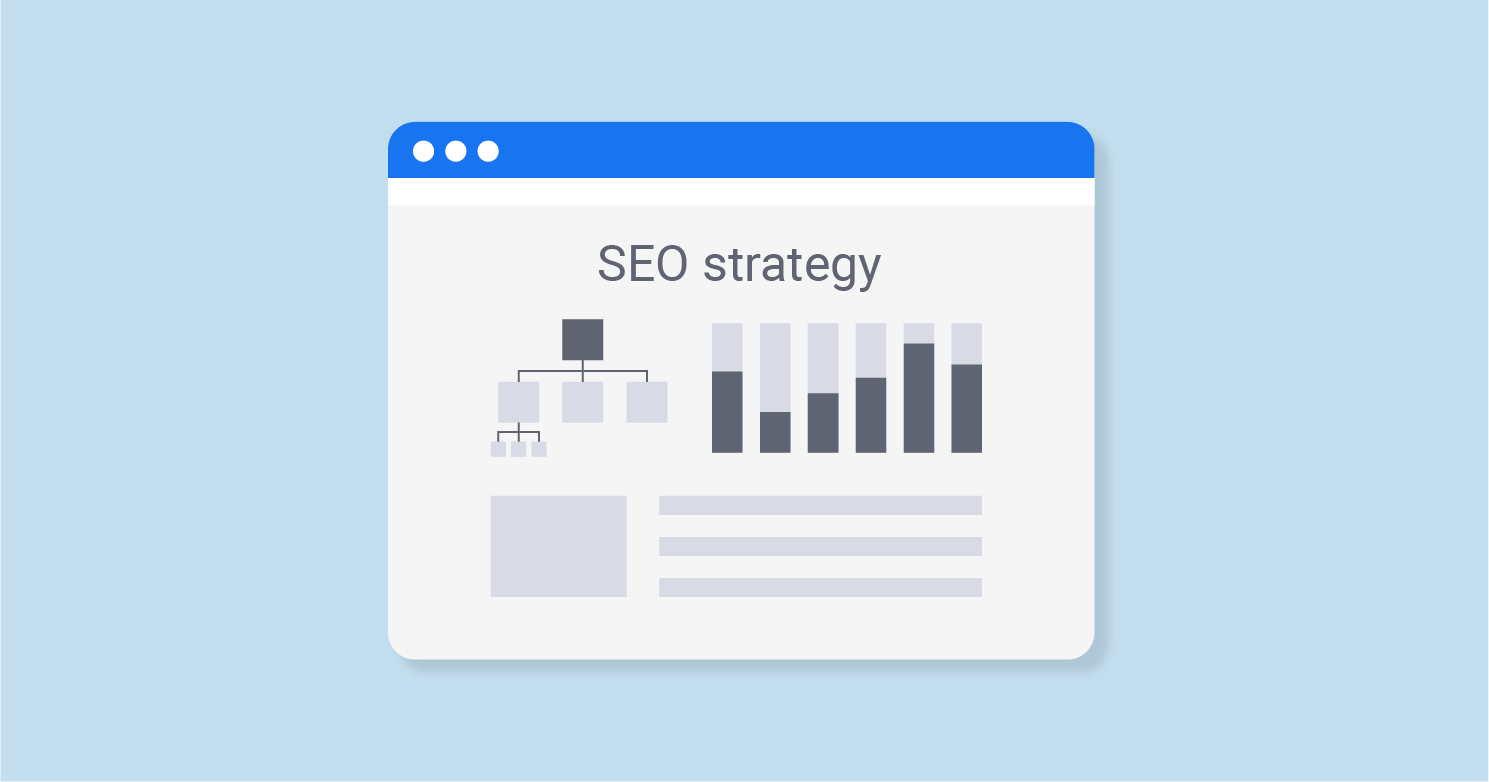What is a Website SEO Score?
A website’s SEO score is a numerical or percentage value that represents the search engine optimization health score, and performance of a site. It offers a snapshot of how well a website is optimized for search engines like Google, Bing, and others. This score is derived from an analysis of various factors that search engines consider important for ranking. These factors can range from technical aspects like site speed and mobile compatibility to content quality and backlink profiles. Using an https://sitechecker.pro/seo-website-grader/ can provide a detailed breakdown of these factors, helping you identify areas for improvement to boost your site’s overall SEO score and ranking potential.
Sitechecker’s Website Score
Website Score is the internal metric that we use in Site Audit. It helps to measure the technical excellence in terms of the SEO of a website. It can be really helpful for tracking the progress you make with Sitechecker and the impact of fixing the errors found in site audit.

The primary objective of an SEO score is to provide website owners, marketers, and SEO professionals with a clear benchmark of their site’s search optimization strengths and weaknesses. This allows them to focus their efforts on areas that require improvement and maintain areas that are already well-optimized.
It’s worth noting that SEO scores can vary based on the tool or platform you use to evaluate them. Each tool might have its own set of criteria and weightage for different factors. Commonly, an SEO score is presented on a scale from 0 to 100, where a higher score indicates better optimization. However, no website is perfect, and even those with high scores might have areas that can be enhanced further.
In essence, an SEO score serves as a diagnostic tool. While it doesn’t guarantee a specific ranking position in search engine results, a higher SEO score generally suggests that a website has a better chance of ranking well because it adheres to best practices recognized in the SEO community.
While optimizing for a high SEO score is crucial, integrating Defacement Monitoring ensures that your site remains secure from unauthorized changes, such as malicious content tampering, which could negatively impact your SEO efforts and overall site integrity.
How Do I Check My Website SEO Score With Sitechecker?
Sitechecker is a reputable online platform that offers SEO analysis for websites. It provides insights into various aspects of your site’s performance, from technical configurations to content quality. Checking your website’s SEO score using Sitechecker is a straightforward process. Here’s how you can do it:
- Visit Sitechecker: Navigate to https://sitechecker.pro/.
-
Enter Your Website URL: On the homepage, you’ll find a search bar or an input field. Type in your website’s URL.
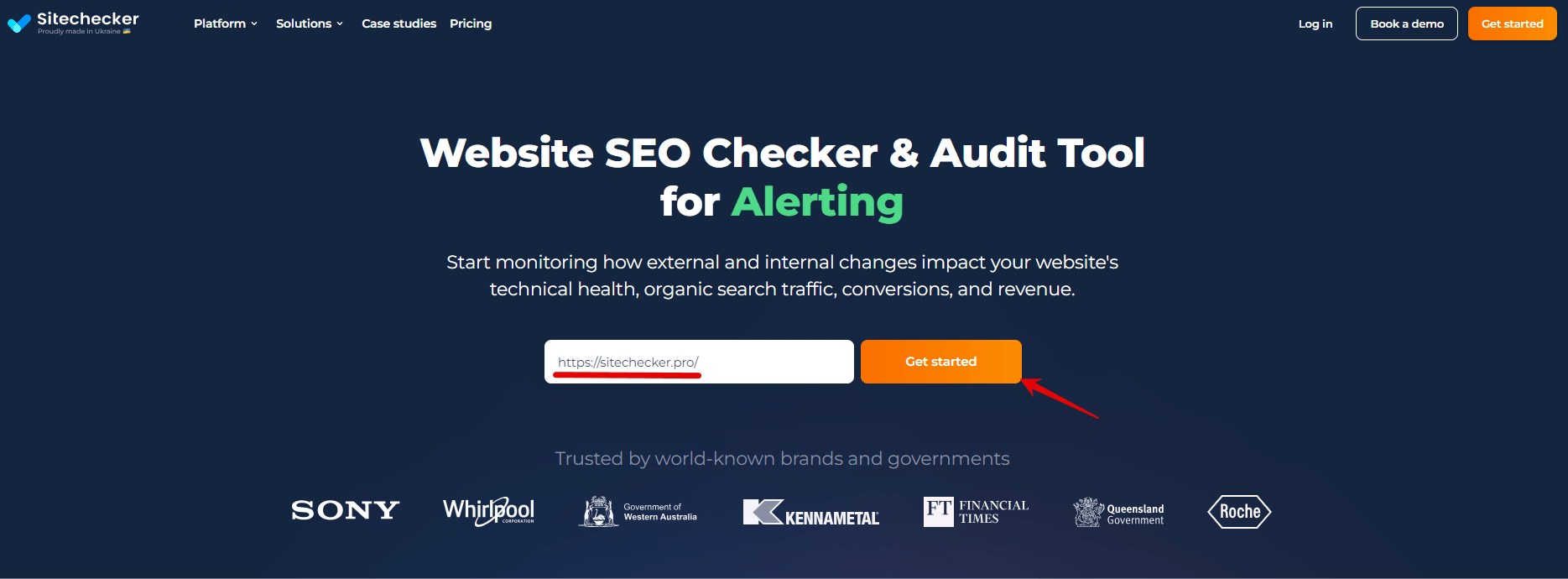
- Start the Analysis: Click on the button, usually labeled “Check” or “Start”, to initiate the website analysis.
-
Review the Results: Once the analysis is complete, Sitechecker will present you with a detailed report. This report will include an overall SEO score, along with insights into various aspects like meta tags, content quality, link profiles, and more.

-
Implement Recommendations: Along with the score, Sitechecker provides actionable recommendations. Use these tips to optimize your website for better search performance.
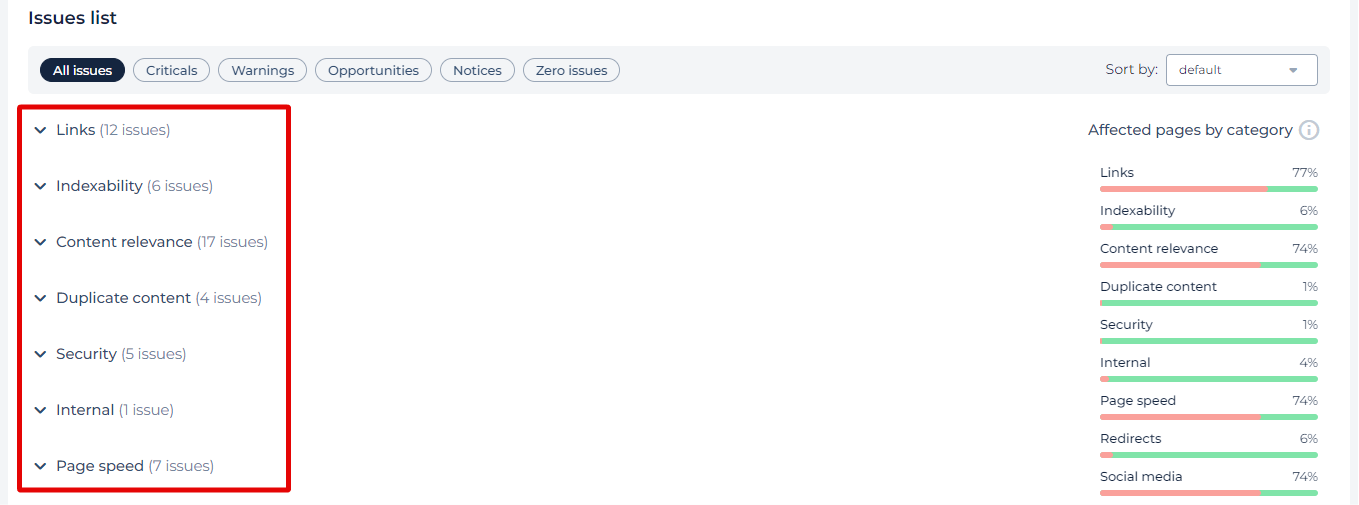
Here is the video about how to use Site Audit tool on Sitechecker platform:
Remember, while tools like Sitechecker provide valuable insights, they’re most effective when combined with manual audits and a comprehensive SEO strategy.
What is an SEO Checker?
An SEO Checker, often referred to as an SEO audit tool, is a digital tool designed to analyze a website’s search engine optimization (SEO) performance. These tools assess various elements of a website, from its technical configuration to its content quality, to determine how well it adheres to best SEO practices.
SEO Checkers typically provide:
- An overall SEO score: A numerical or percentage value representing the site’s optimization level.
- Breakdown of issues: Detailed insights into elements that need improvement, like broken links, missing meta tags, slow loading speeds, etc.
- Actionable recommendations: Suggestions on how to fix identified issues and optimize the website further.
SEO Checkers are valuable resources for website owners, digital marketers, and SEO professionals, enabling them to identify areas of improvement and maintain SEO health. Whether you’re launching a new site or refining an existing one, these tools can provide critical insights to help ensure your website performs well in search engine results.
Factors That Impact Your Website SEO Score:
Search engine optimization (SEO) is a complex process influenced by numerous factors. Understanding these factors is pivotal in optimizing your website for search engines. Let’s delve into the key elements that impact your website’s SEO score:
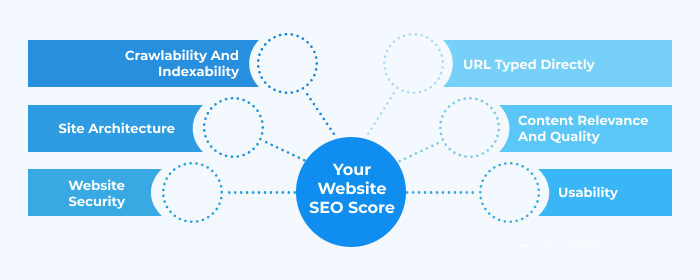
Crawlability and Indexability
Crawlability refers to a search engine’s ability to access and crawl through all the content on your website. Indexability, on the other hand, is about whether the search engine can then add that page to its index. If a search engine can’t crawl or index your site effectively, it won’t rank well. Key aspects influencing crawlability and indexability include:
- Robots.txt file settings
- Website’s XML sitemap
- Broken links or dead pages
- Server errors
Site Architecture
A well-structured website ensures that search engines can easily navigate through your content and that users can find the information they’re seeking efficiently. Aspects that play a role include:
- Logical hierarchy and URL structure
- Internal linking strategies
- Breadcrumb navigation
- Effective use of categories and tags
Website Security
Search engines prioritize sites that ensure a safe browsing experience for users. A secure site is more likely to rank higher. Important factors here include:
- Use of HTTPS (SSL certificates)
- Absence of malware or suspicious scripts
- Regular security audits and updates
Usability
This factor revolves around how user-friendly your website is. If users find it difficult to navigate or utilize your site, they’re likely to leave, increasing the bounce rate. Usability considerations include:
- Site speed and loading times
- Easy navigation
- Clear call-to-actions (CTAs)
- Responsive design
Structured Data
Structured data refers to specific code formats that you can add to your website’s pages, making it easier for search engines to understand your content. Incorporating structured data can lead to rich snippets in other search engines’ results. Key aspects include:
- Use of Schema.org markup
- Proper implementation of JSON-LD or Microdata formats
- Accurate representation of page content
Content Relevance and Quality
Content remains king in the realm of SEO. Search engines aim to deliver the most relevant and high-quality content to users. Factors influencing content quality include:
- Originality and uniqueness
- Depth and comprehensiveness
- Keyword optimization without keyword stuffing
- Proper use of headers and subheaders
User Experience and Mobile Usability
With the rise of mobile searches, ensuring your website is mobile-friendly is essential. Moreover, a seamless user experience (UX) directly influences user satisfaction and engagement. Important elements here are:
- Mobile responsiveness
- Intuitive design
- Minimal intrusive interstitials or pop-ups
- High-quality visuals and legible fonts
In addition to optimizing design for mobile, enabling GZIP Compression can further enhance mobile usability by reducing file sizes and improving load times. This ensures that mobile users experience faster page loads and smoother navigation, contributing to overall user satisfaction and higher engagement rates.
Webmaster Trends Analyst at Google about SEO scores
John Mueller, a Webmaster Trends Analyst at Google, has tweeted about website SEO scores on a number of occasions. In general, he has said that there is no one definitive SEO score, and that different tools will give different results. He has also said that SEO scores are not a perfect reflection of how a website will rank in Google Search.
In one tweet on November 12, 2019, Mueller said:
In another tweet on September 4, 2018, he said:
Mueller has also said that SEO scores should not be used to compare websites to each other. He has said that the best way to compare websites is to look at their organic traffic levels.
In one tweet on April 1, 2021, he said:
Overall, Mueller’s advice on website SEO scores is to take them with a grain of salt. They can be useful for getting a general idea of how a website is performing, but they should not be used as a definitive measure of SEO success.
Here are some additional tips from John Mueller on improving your website’s SEO:
- Focus on creating high-quality content that is informative and relevant to your target audience.
- Make sure your website is technically sound and easy to navigate.
- Build backlinks from high-quality websites.
- Be patient and consistent with your SEO efforts.
It is important to note that SEO is a complex and ever-changing field. There is no one-size-fits-all approach to SEO, and what works for one website may not work for another. The best way to improve your website’s SEO is to stay up-to-date on the latest trends and best practices, and to create a custom SEO strategy that is tailored to your specific website and goals.
Importance of a Good Website SEO Score
An SEO score serves as a quantifiable benchmark to evaluate the search engine optimization health and performance of a website. But why is this score crucial? And what is seo score and how does the technical side of SEO play into it?
Why is Your Website SEO Score So Important?
Your website’s SEO score is a reflection of its overall site health, in terms of search engine optimization. Here’s why it matters:
- Visibility and Rankings: A higher SEO score typically correlates with better visibility in search engine results. Improved rankings can lead to increased organic traffic.
- User Experience: A good SEO score often means your website provides a better user experience. Aspects like site speed, mobile usability, and content relevance, which factor into your score, directly impact user satisfaction.
- Competitive Edge: In the digital space, competition is fierce. Having a higher SEO score can give you an edge over competitors, ensuring potential customers find your site first.
- Trust and Credibility: Websites that rank higher are often perceived as more trustworthy and credible by users. A better SEO score can contribute to a positive brand image.
- Increased ROI: Organic search traffic is often more valuable than paid traffic. Investing in optimizing your site to boost your SEO score can result in a higher return on investment in the long run.
How Does Technical SEO Affect My SEO Score?
Technical SEO refers to the optimizations made on the backend of your website that can influence search engine crawling, indexing, and ultimately, rankings. Here’s how it impacts your SEO score:
| Site Speed | Slow loading times can harm both user experience and search rankings. Search engines prioritize sites that load quickly. |
| Mobile Optimization | With a significant portion of users accessing sites via mobile devices, having a mobile-optimized site is essential. It affects both your user experience and your site’s ranking potential. |
| Secure and Accessible Website | Using HTTPS (a secure version of HTTP) is a ranking factor. An accessible site, free of crawl errors, ensures search engines can index it efficiently. |
| XML Sitemap | A clear sitemap provides search engines with a roadmap of your website, ensuring all pages are discovered and indexed. |
| Structured Data | As previously mentioned, structured data can lead to rich search results, enhancing visibility and click-through rates. |
| Broken Links and Redirects | Broken links can harm user experience and hinder search engine crawlers. Properly implemented redirects ensure users and crawlers find the content they’re looking for. |
Other SEO Score Metrics:
While the general SEO score provides an overarching view of a website’s optimization health, there are several other specific metrics that SEO professionals often consider. These metrics delve deeper than site health score and into certain aspects of a site’s performance, offering more granular insights.
Domain Authority vs. SEO Score
Domain Authority (DA) is a metric developed by Moz that predicts how well a website will rank on search engine result pages (SERPs). It ranges from 1 to 100, with higher scores indicating a greater ability to rank.
- Nature: While an SEO score gives an overall view of a site’s optimization, including content quality, technical aspects, and user experience, DA focuses primarily on link profiles, considering the number and quality of external sites linking to you.
- Use: SEO professionals often use DA to assess the value of inbound links or gauge the competition in SERP rankings. On the other hand, an SEO score provides actionable insights across various factors for optimization.
Authority Score
Authority Score is a composite metric that combines domain authority and page authority, providing insights into a website’s overall quality and its potential to rank well in search.
- Components: Authority Score takes into account factors like domain score, trust score, referring domains, backlink types, and organic search traffic. It’s a holistic measure of a website’s strength and credibility in search engines.
- Applications: SEO professionals might use the Authority Score to evaluate potential backlink sources or to benchmark against competitors.
On-Page SEO Score
On-Page SEO Score is a metric that evaluates how well a specific page on a website is optimized for search engines. It considers elements present on the web page itself, excluding off-page factors like backlinks.
- Factors Considered: This includes keyword placement (title, meta descriptions, headers), content quality, internal linking, user experience, mobile optimization, and more.
- Purpose: An On-Page SEO Score is used to identify areas of improvement on individual pages. By addressing these, one can optimize the page to rank better for targeted keywords.
How to Improve Your SEO Score:
Improving your SEO score is a comprehensive process that involves tweaking various aspects of your website, both technical and content-driven. Implementing best practices and proven strategies is the key to enhancing your site’s optimization, ensuring better search engine rankings, and driving organic traffic.
Best Practices and Strategies
- Quality Content Creation: Consistently produce original, informative, and engaging content tailored to your audience. This not only attracts visitors but also establishes your website as an authority in your niche.
- Keyword Optimization: Research relevant keywords using tools like Keyword Suggestion Tool for SEO & PPC. Incorporate them naturally into your content, meta titles, and descriptions.
- Mobile Optimization: Ensure your website is responsive and provides a seamless experience across devices, especially mobile, given the significant volume of mobile searches.
- Optimize Website Speed: Compress images, utilize browser caching, and consider using a Content Delivery Network (CDN) to reduce load times.
- Internal Linking: Build a network of internal links to guide users through your website and help search engine crawlers understand the hierarchy and relationship between pages.
- Acquire Quality Backlinks: Engage in guest posting, create shareable content, and build relationships with influencers in your industry to earn high-quality backlinks.
- Technical SEO: Ensure your site is crawlable and indexable by optimizing robots.txt, creating an XML sitemap, and addressing any crawl errors.
- Structured Data Implementation: Use Schema.org markups to help search engines understand the context of your content, potentially leading to rich snippets in SERPs.
- Improve User Experience (UX): Design your website with the user in mind. Easy navigation, a clear call-to-action, and an intuitive layout can enhance UX.
- Regular Audits: Periodically use SEO tools and platforms to audit your website. Addressing issues and staying updated with SEO trends is essential for maintaining and improving your score.
- Secure Your Website: Shift to HTTPS if you haven’t already, ensuring data integrity and establishing trust with your users and search engines.
- Local SEO: If you’re a local business, optimize for local searches by creating a Google My Business listing, acquiring local backlinks, and generating positive reviews.
- Avoid Black Hat Techniques: Refrain from using deceptive SEO techniques like keyword stuffing, cloaking, and buying links. Such practices can lead to penalties.
Estimated Timeframe:
Achieving a good SEO score is a continuous process that doesn’t yield overnight results. Several factors determine the timeframe, ranging from your website’s current state, competition, and the strategies you employ.
How Long Does it Take to Get a Good SEO Score?
Understanding how long it takes to achieve a desirable SEO score requires a grasp of the various influencing factors:
- Starting Point: Websites that already follow some SEO best practices might see improvements sooner than those beginning from scratch.
- Competition: If your niche or industry is highly competitive, it might take longer to see improvements, especially in SERP rankings.
- Content Creation and Update Frequency: Regularly updating your website with quality content can expedite improvements in your SEO score.
- Quality of Backlinks: Acquiring high-quality backlinks can boost your SEO score faster than numerous low-quality ones.
- Technical Issues: Websites with numerous technical issues (like broken links, crawl errors, or slow loading times) may require more time for corrections and subsequently for SEO improvement.
- Algorithm Updates: Search engine algorithms, especially Google’s, are updated frequently. Some updates might benefit your website, while others could pose challenges, impacting the time to achieve your desired SEO score.
- Black Hat Techniques: If a website has previously engaged in black hat SEO practices, recovering from any penalties and rebuilding its SEO score can take considerable time.
- Consistency of Effort: Continuous and consistent SEO efforts will yield results faster than sporadic or infrequent activities.
As a general guideline, many SEO professionals note that it can take anywhere from 3 to 6 months to start seeing improvements in SEO scores and rankings, especially for new websites. However, more competitive niches or industries can take up to a year or more. The key is persistence, regular monitoring, and adaptation to the dynamic world of SEO.
Summary
SEO is essential for enhancing website visibility in search engine results. A website’s SEO score reflects its optimization health, influenced by metrics like Domain Authority and On-Page SEO Score. To improve this score, a blend of content, technical adjustments, and backlink strategies is crucial. Results typically manifest between 3 to 6 months, emphasizing the need for consistent effort and patience in the realm of SEO.
